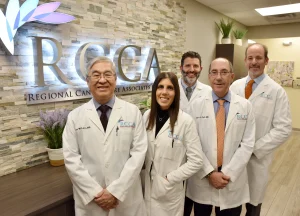
PSMA Therapy for Metastatic Prostate Cancer
A targeted, infused therapy that delivers radiation directly to cancerous cells has been shown to extend survival in many patients with metastatic prostate cancer. The
HIPAA Alert: Potential Data Breach Learn More
Questions on Oncology, Hematology and/or Infusion Clinical Services due to COVID-19 Crisis – CALL 833-698-1623
Important Information for Our Patients Regarding the Coronavirus.
RCCA Providing Area Cancer Patients with Access to Care During Coronavirus Outbreak
RCCA Offering Patients Virtual Visits During Coronavirus Pandemic
When country music singer and songwriter Toby Keith died on February 5 at age 62, his passing brought renewed attention to a type of cancer that has become relatively uncommon in recent years.
Keith died of stomach cancer, also known as gastric cancer. He had been diagnosed with the condition in late 2021, and had been treated with chemotherapy, radiation, and surgery.
Seth Berk, MD, a board-certified medical oncologist and hematologist, says, “Gastric cancer was the leading cause of cancer death in the United States in the early part of the 20th Century, but today it represents just 1.5% of all cancer diagnoses. In 2024, the American Cancer Society estimates there will be roughly 26,890 new cases identified in the U.S., and about 10,880 deaths from the disease.”1 Dr. Berk, who practices at the Moorestown, NJ office of Regional Cancer Care Associates (RCCA), one of the nation’s largest oncology networks, adds that the diagnosis rate and the death rate for gastric cancer have been declining steadily in recent years.

Why are there fewer cases of the disease? Paul Bannen, MD, says that two main factors are involved. “One hundred years ago, when stomach cancer was the top cause of cancer death in America, very few people had refrigerators. Instead, they often smoked or salted their food to preserve it from spoiling. The salting and smoking processes are known risk factors for developing cancer. And while the era before refrigerators may seem like ancient history, a diet heavy in salted meat and fish and pickled vegetables remains a risk factor for stomach cancer. Regularly eating processed, grilled, or charcoaled meat also may increase the risk of certain types of gastric cancer.”
Dr. Bannen, a board-certified medical oncologist who practices at RCCA’s Clarksburg, Olney, and Rockville, MD offices, adds that infection with Helicobacter pylori, also referred to as H. pylori, also appears to be a major risk factor for stomach cancer. As physicians identify more and more H. pylori infections and treat them with antibiotics and another type of medication called a proton pump inhibitor, the risk of stomach cancer is reduced accordingly. Dr. Bannen adds, however, that most people who have H. pylori bacteria in their gastrointestinal tract will not develop stomach cancer.
Better treatments, fewer deaths
The National Cancer Institute reports that age-adjusted death rates for gastric cancers fell an average 2.1% each year from 2011 through 2020.2
Chitra Kumar, MD, says that the declining death rate is largely attributable to advances that enable physicians to take a comprehensive, multi-modal approach to care. “Today, medical oncologists, surgeons, and radiation oncologists collaborate closely to identify which treatment or combination of treatments is best suited for a particular patient. In many cases, this will entail a sequence of interventions, such as surgery followed by medical therapy, radiation, or both.”
Dr. Kumar, a board-certified medical oncologist who practices at the Edison, NJ office of RCCA, adds that the options for medical management of stomach cancer include not only chemotherapy but also immunotherapies that harness the immune system’s ability to fight disease and targeted therapies, such as tyrosine kinase inhibitors. She explains that these targeted therapies act specifically against cancer cells or molecules that support the functioning of cancer cells while not affecting healthy cells.
“We have a greater ability than ever before to treat gastric cancer effectively, and research now under way suggests that even further advances are on the near horizon,” the cancer specialist says.
What you should know – and do
Understanding the risk factors for a disease and then addressing those that can be modified are critical steps in guarding your health. In addition to H. pylori infection and the dietary patterns discussed above, risk factors for gastric cancer include:3
Joseph McLaughlin, MD, notes that while risk factors such as age and hereditary conditions cannot be modified, many others are within a person’s power to change. “Not using tobacco, cutting back on or eliminating alcohol consumption, and reducing weight all are steps that will reduce the risk not just for stomach cancer but also for more common forms of the disease, such as lung cancer, colorectal cancer, and liver cancer,” says Dr. McLaughlin, a board-certified medical oncologist and hematologist who practices at RCCA’s Manchester, CT office.
The cancer specialist adds, “Reducing cancer risk isn’t just about what you lose or give up. It’s also about what you embrace. For example, there is evidence that a diet high in fruits and raw vegetables can reduce the risk for gastric cancer. This sort of plant-based diet also has been shown to be beneficial in preventing other forms of cancer as well as cardiovascular disease.”
Dr. McLaughlin says, “While prevention is key, and can lead to further reductions in stomach cancer diagnoses and deaths, we want people who are facing gastric cancer or other cancers to know that RCCA’s physicians, nurses, and other clinicians are committed to providing them with the latest evidence-based therapies and comprehensive, compassionate care in the community setting. We hope you will never need our services, but if you do, we’re here for you.”
+++++++
Drs. Berk, Bannen, Kumar, and McLaughlin are among 90+ cancer specialists who treat patients at more than 20 RCCA care centers throughout New Jersey, Connecticut, Maryland, and the Washington, DC, area. RCCA oncologists and hematologists see more than 26,000 new patients each year and provide care to more than 245,000 established patients, collaborating closely with their patients’ other physicians. They offer patients the latest in cutting-edge treatments, including immunotherapies and targeted therapy, as well as access to a wide range of clinical trials. In addition to serving patients who have solid tumors, blood-based cancers, and benign blood disorders such as anemia, RCCA care centers also provide infusion services to people with a number of non-oncologic conditions—including multiple sclerosis, Crohn’s disease, asthma, iron-deficiency anemia, and rheumatoid arthritis—who take intravenously-administered medications.
To learn more about RCCA, call 1-844-346-7222 or visit RCCA.com.
References:
For more information or to schedule an appointment,
call 844-346-7222. You can also schedule an appointment by calling the RCCA location nearest you.

A targeted, infused therapy that delivers radiation directly to cancerous cells has been shown to extend survival in many patients with metastatic prostate cancer. The

Patients receiving treatment from Regional Cancer Care Associates in Moorestown are in good hands. Five of its physicians — Dr. Seth Berk, Dr. Maurice Cairoli, Dr.

The world of cancer treatment is rapidly evolving. New therapies are being discovered, and existing ones have improved, resulting in better patient outcomes. Regional Cancer

Regional Cancer Care Associates is one of fewer than 200 medical practices in the country selected to participate in the Oncology Care Model (OCM); a recent Medicare initiative aimed at improving care coordination and access to and quality of care for Medicare beneficiaries undergoing chemotherapy treatment.